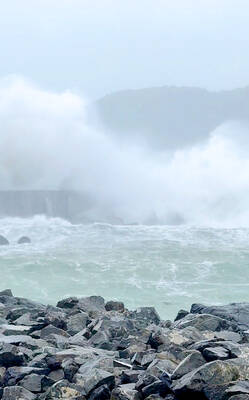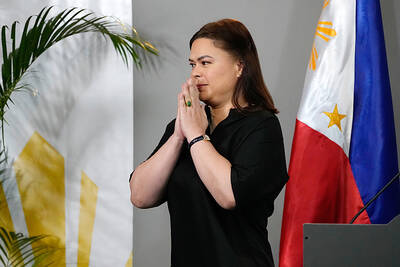In a country where people pride themselves on tranquility and deference, Thai Prime Minister Thaksin Shinawatra shows little of either trait.
Thaksin, a former policeman who got rich in the telecommunications business, is out front and boastful, asserting that Thailand can serve as the leader of a newly vibrant Southeast Asia. He is the region's modern man, he says.
But complaints about an increasingly authoritarian style and perceptions that his government's decisions benefit his family's financial interests have taken the sheen off the region's rising star.
His most immediate political problems center on unrest in the Muslim-dominated south and anger over his government's failure to warn about the outbreak of Asian bird flu even though officials knew the disease was at hand.
In the capital, intellectuals refer to Thaksin as the Berlusconi of Asia, a reference to Italian Prime Minister Silvio Berlusconi, a business tycoon who has faced continuing accusations of conflict of interest.
Thaksin ran his corporation as a one-man show, and he runs the country the same way, his critics assert. He has tightened his grip on television, radio and the newspapers -- leaving few news outlets free of political influence.
"He doesn't have a democratic instinct," said Ammar Siamalla, one of the country's leading economists.
`Warning machine'
Asked by Thai reporters about the growing criticism, Thaksin responded, "Decisiveness isn't dictatorship." Anyway, he said, his wife, Pojamarn, a general's daughter and businesswoman, always keeps him in check.
"The Thais have my wife as a warning machine," he said.
The US added to the criticism recently, saying in its annual human rights report that the Thaksin government had killed many civilians during its crackdown on drug trafficking last year.
In response, Thaksin called the US a "useless friend," perhaps implying that Washington should be more grateful for Thailand's contribution of nearly 500 troops in Iraq.
In many respects, Thaksin, 54, who has a degree in criminal justice from Sam Houston State University in Texas and recently wore a watermelon pink shirt to a Cabinet meeting, has delivered on his election promises.
Thailand's economy was one of the standouts in Asia last year, growing by more than 6 percent. With steady demand from China for electronic parts, petrochemicals and rubber, Thailand can expect even higher growth this year, said Supavud Saicheun, chief of research at Phatra Securities.
In a major face-lift for the country, Thaksin is pushing ahead on plans for Heaven City, a satellite city intended as a smog-free alternative to the traffic-choked capital. He says he will replace the worn-out international airport, and he wants to upgrade the railways. He has challenged the Thai auto industry to become the Detroit of the region, and he has urged Thailand's little-known fashion designers to elevate Bangkok to become the Paris of the East.
Along with the increased public spending, he has encouraged easy credit for corporations and consumers. He has provided the nation's 70,000 villages with a system of microcredits and introduced almost free health care at hospitals.
These programs have increased his popularity: He is regarded as the first Thai prime minister to act on behalf of the poor. But the programs have not worked smoothly.
Villagers in Thaksin's home area around the northern city of Chiang Mai say many poor people have run up large debts because they have little understanding of the obligations of borrowing.
Tong Taan Wong, 66, a shopkeeper, said he resigned from his village's loan committee because he did not want to be involved in the unpopular cause of debt collection.
Nepotism
In Bangkok, nepotism is a major concern. The prime minister's cousin, General Chaiyasit Shina-watra, is now commander in chief of the army. One of Thaksin's sisters, Yaowapha Wongsawat, heads a faction within the governing Thai Rak Thai Party. Another sister, Yaovares Shinawatra, is the leader of the National Council of Women.
Somkiat Tangkitvanich, an economist and a research director at the Thailand Development Research Institute, recently completed a study of how political connections affected Thai businesses. His analysis showed that companies on the Bangkok stock exchange in which the Shin Corp, the Thaksin family's company, owned significant holdings, did spectacularly better last year than other listed companies, including those whose major shareholders included families of Cabinet members.
Further, Somkiat said, a government decree effectively barred the liberalization of the telecommunications industry, which is dominated by the Thaksin family company. The decree added an excise tax on new telecommunication companies.
Media under pressure
Since Thaksin took office, news organizations have come under intense pressure from the government. The editor of the influential English-language daily, The Bangkok Post, Veera Pratheepchaikul, was removed last month after the newspaper ran articles critical of Thaksin. Other journalists and editors have been dismissed. The family of a senior Cabinet member has become a major stockholder of a second English-language daily, The Nation.
Asked about the assertion that the government policies favored the prime minister's family interests, Thaksin's spokesman, Jakrapob Penkair, said: "The prime minister wants the economy to be better off because then everyone benefits. He compares the economy to a container. When it rains, a big container collects more water, a small container less."
Giving a rendition of trickle-down economics, Jakrapob said those who had a big container in the economy -- the wealthy -- received "more reward" but those with a small container also benefited.
Somkiat, the economist who studied the Thaksin administration, said, "I'd say Thaksin has the only container."

FEROCIOUS FISH-EATER Scientists have found a new species of dinosaur from the Cretaceous Period, a ‘hell heron’ that stalked the rivers, deep in the Saharan desert At a remote Sahara desert site in Niger, scientists have unearthed fossils of a new species of Spinosaurus, among the biggest of the meat-eating dinosaurs, notable for its large blade-shaped head crest and jaws bearing interlocking teeth for snaring fish. It prowled a forested inland environment and strode into rivers to catch sizable fish like a modern-day wading bird — a “hell heron,” as one of the researchers put it, considering it was about 12 meters long and weighed 5-7 tons. The dinosaur presented a striking profile on the Cretaceous Period landscape of Africa some 95 million years ago as it hunted

Heavy rain and strong winds yesterday disrupted flights, trains and ferries, forcing the closure of roads across large parts of New Zealand’s North Island, while snapping power links to tens of thousands. Domestic media reported a few flights had resumed operating by afternoon from the airport in Wellington, the capital, although cancelations were still widespread after airport authorities said most morning flights were disrupted. Air New Zealand said it hoped to resume services when conditions ease later yesterday, after it paused operations at Wellington, Napier and Palmerston North airports. Online images showed flooded semi-rural neighborhoods, inundated homes, trees fallen on vehicles and collapsed

‘COST OF DEFECTION’: Duterte’s announcement could be an effort to keep allies in line with the promise of a return to power amid political uncertainty, an analyst said Philippine Vice President Sara Duterte yesterday announced she would run for president of the Southeast Asian nation of 116 million in 2028. Duterte, who is embroiled in a bitter feud with Philippine President Ferdinand Marcos Jr, was impeached last year only to see the country’s Supreme Court throw the case out over procedural issues. Her announcement comes just days before her father, former Philippine president Rodrigo Duterte, begins a pretrial hearing at the International Criminal Court (ICC) in the Netherlands over crimes against humanity allegedly committed as part of a brutal crackdown on drugs. “I offer my life, my strength and my future

NOT YET THERE: While the show was impressive, it failed to demonstrate their ability to move in unstructured environments, such as a factory floor, an expert said Dancing humanoid robots on Monday took center stage during the annual China Media Group’s Spring Festival Gala, China’s most-watched official television broadcast. They lunged and backflipped (landing on their knees), they spun around and jumped. Not one fell over. The display was impressive, but if robots can now dance and perform martial arts, what else can they do? Experts have mixed opinions, with some saying the robots had limitations and that the display should be viewed through a lens of state propaganda. Developed by several Chinese robotics firms, the robots performed a range of intricate stunts, including martial arts, comedy sketches and choreographed